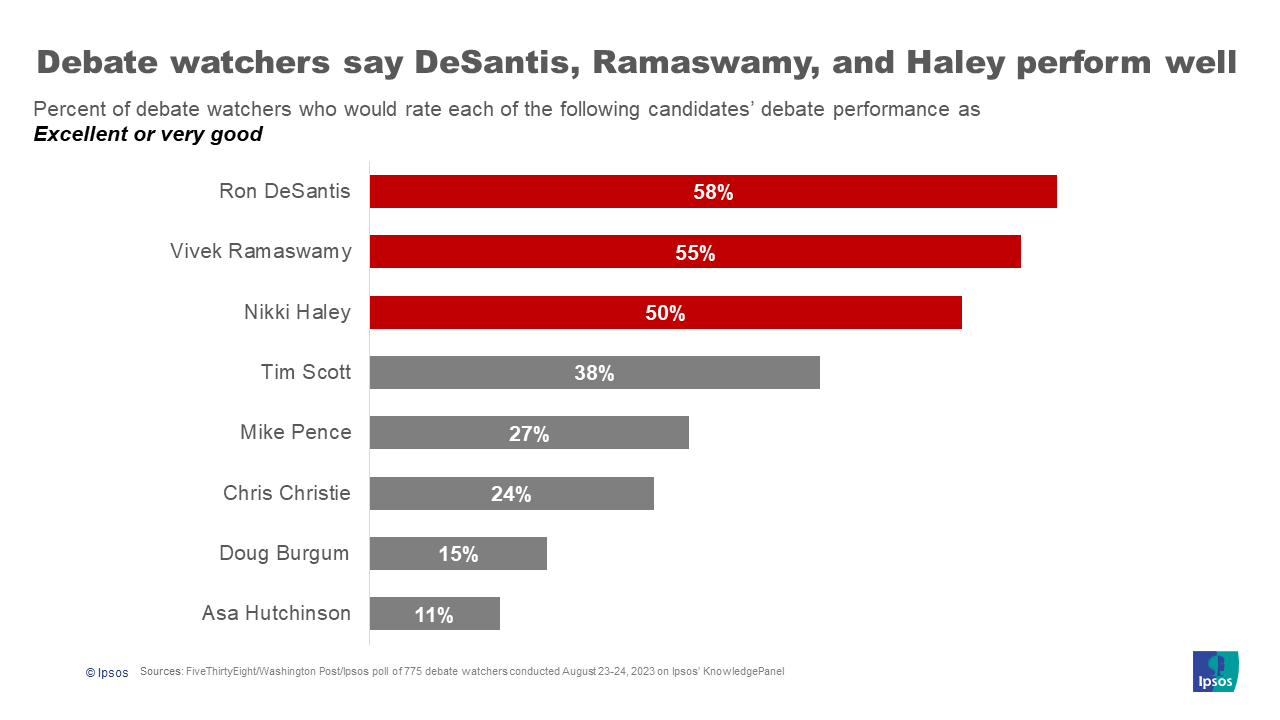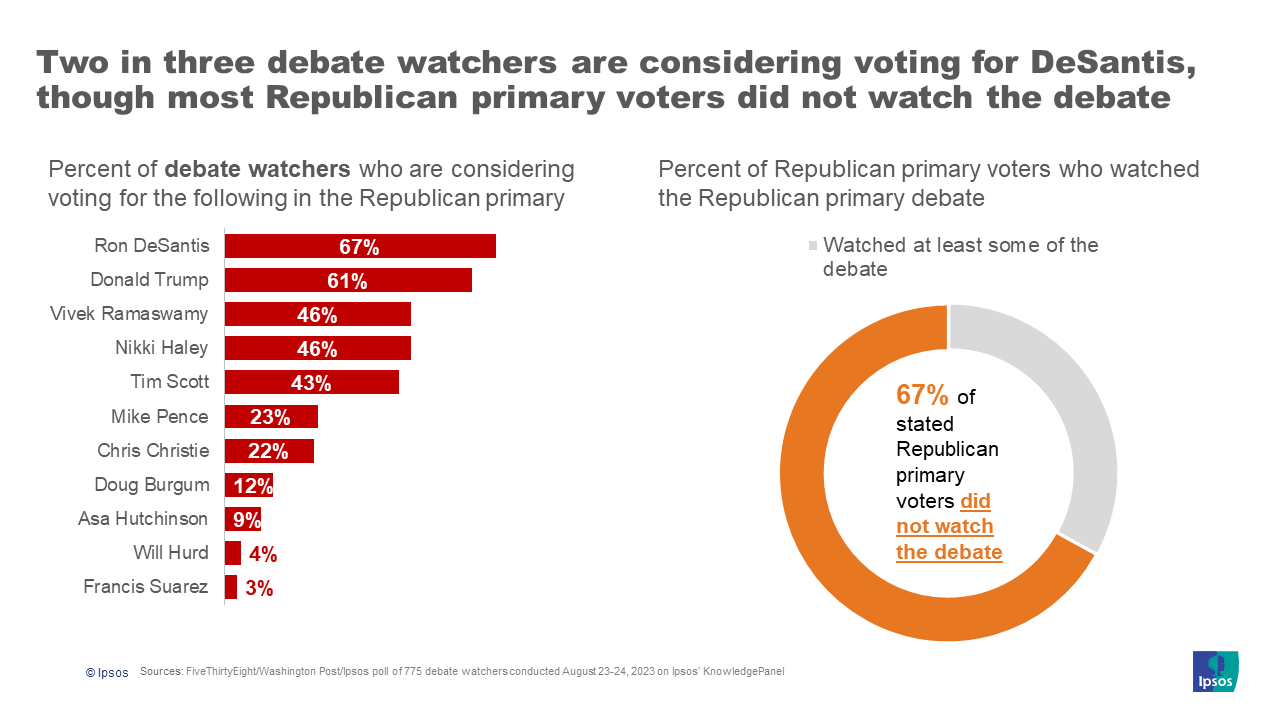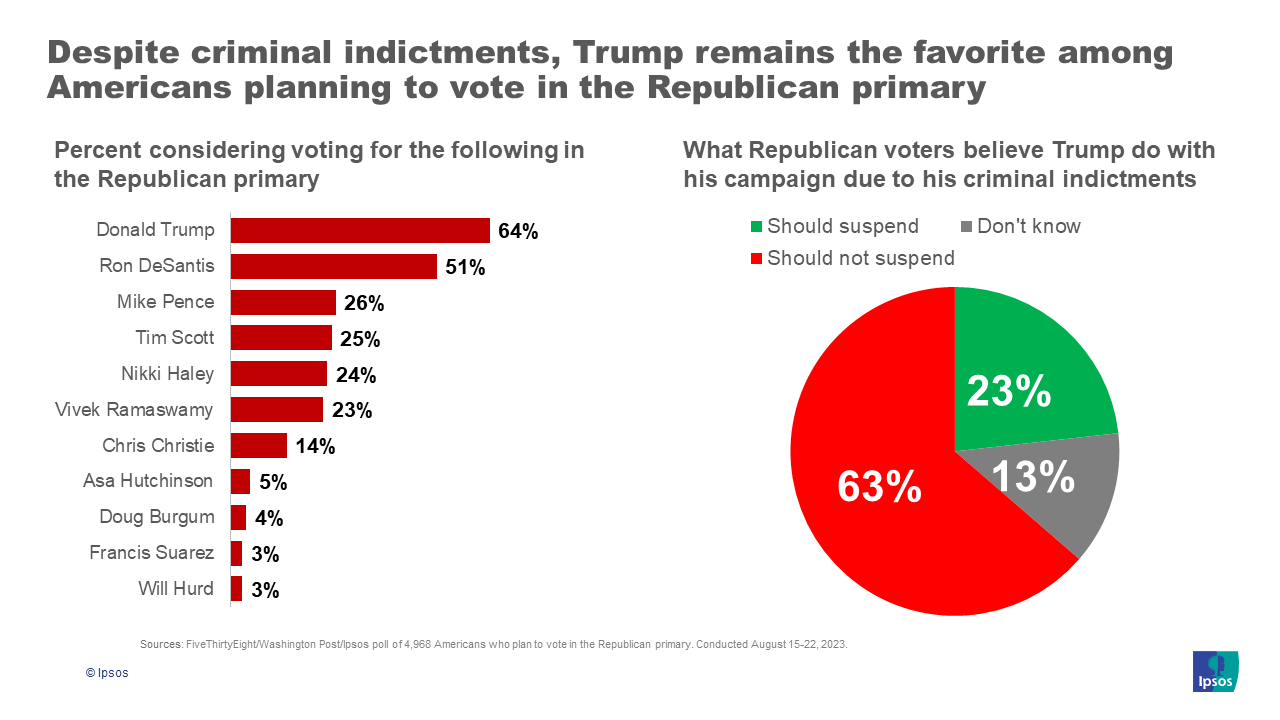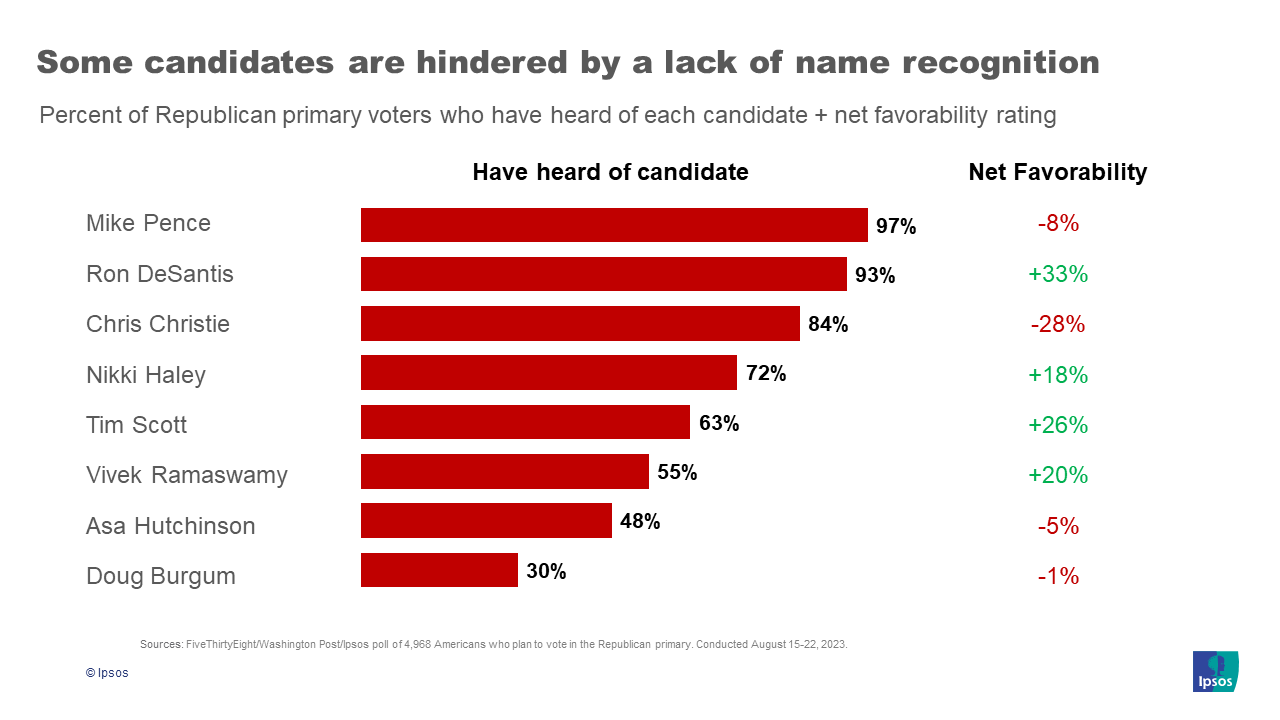DeSantis, Ramaswamy, Haley seen as top performers in first Republican debate
Washington DC, August 24, 2023— A new FiveThirtyEight/Washington Post/Ipsos conducted immediately following the first Republican primary debate finds that Ron DeSantis, Vivek Ramaswamy, and Nikki Haley are viewed by those who watched the debate as the best performers. Post-debate, this trio of candidates also has favorability ratings that compete with former president and current frontrunner Donald Trump, although only DeSantis has a similar percentage of debate watchers who are considering voting for him. Lastly, while all three candidates performed well in the eyes of those who watched the debate, two in three Republican primary voters did not watch any of the debate. Read more from FiveThirtyEight and the Washington Post.
Detailed findings:
1. One in three Republican primary voters say they watched Wednesday’s debate.
- Fifteen percent report that they watched all of the debate, while 17% say they watched some of it.
- Among the 67% of GOP primary voters who did not watch the debate, just 7% report watching Tucker Carlson’s interview with Donald Trump.
2. Ron DeSantis and Vivek Ramaswamy are seen as the best performers in Wednesday’s debate, followed by Nikki Haley.
- Twenty-nine percent of debate watchers believe DeSantis performed the best. Ramaswamy is close behind at 26%, followed by Haley at 15%. No other candidate receives more than 7%.
- Republicans (34%) are more likely than independents (21%) to believe that DeSantis performed the best among the candidates. In contrast, Haley performs better among independents (22%) than Republicans (11%).
- When asked who performed the worst, Chris Christie (22%) was the most selected candidate. At least ten percent of respondents say the same of Asa Hutchinson (14%), Mike Pence (13%), and Ramaswamy (11%).
3. DeSantis, Ramaswamy and Haley also had the highest performance ratings among debate watchers.
- Fifty-eight percent rate DeSantis’ performance as either excellent or good. Close behind are Ramaswamy (55%) and Haley (50%).
- Tim Scott (38%) led the second tier of candidate performances followed by Pence (27%) and Christie (24%). Both Doug Burgum (15%) and Hutchinson (11%) are below 20%.

4. DeSantis, Ramaswamy, Haley, and Scott have favorability ratings that rival or beat Trump’s among debate watchers. However, only DeSantis is on par with Trump in terms of those considering voting for him.
- After watching the debate, 72% have a favorable rating of DeSantis. Three in five report the same for Haley (65%), Ramaswamy (60%), and Tim Scott (65%).
- Trump (59%) has a similar favorability rating to Haley, Scott, and Ramaswamy.
- When asked if they are considering voting for a candidate, 67% of debate watchers say they are considering voting for DeSantis (67%). This is significantly ahead of Haley (46%), Ramaswamy (46%), and Scott (43%), and in line with Trump (61%).
- Both Trump and DeSantis continue to fare better among Republicans than independents, while the opposite is true for Haley.

5. While debate watchers are generally fine with the performance of the moderators’, according to debate watchers, there is room for improvement in terms of the coverage of certain topics.
- A plurality (44%) rates the performance of the moderators as excellent or good. Thirty-nine percent believe they are average, while just 14% say poor or terrible.
- Debate watchers 65+ (50%) are more likely to say the moderators’ performance was excellent or good than those 18-34 (35%) and 35-49 (38%), though the base size for those under 35 is low.
- In terms of how individual topics are covered, a plurality selected average for each. However, the net rating varies by topic:
- How to build the American economy: 46% selected average; +21% net rating
- Dealing with immigration: 41% selected average; +20% net rating
- Reducing crime and promoting public safety: 45% selected average; +15% net rating
- Wokeness or political correctness: 39% selected average; -6% net rating
- Donald Trump’s indictments: 39% selected average; -11% net rating
About the Study
The post-debate wave of the FiveThirtyEight/Washington Post/Ipsos poll was conducted August 23 to 24, 2023, by Ipsos using the probability-based KnowledgePanel®. The pre-debate wave of this poll was based on a nationally-representative probability sample of adults age 18 or older fielded August 15 to 22, 2023, screened to those indicating they are likely to vote in the upcoming Republican primary or caucus (n=4,968). The post-debate wave, which this topline reports, was administered to the same sample of respondents who took part in the pre-debate wave. Of those, N=2,219 responded to the post-wave survey and N=775 reported watching all or part of the debate.
The margin of sampling error among those who responded to the post-debate survey is plus or minus 2.4 percentage points at the 95% confidence level. The margin of sampling error among those who watched all or part of the debate is plus or minus 4.0 percentage points. The margin of sampling error takes into account the design effect, which was 1.32 for respondents and 1.29 for debate watchers. The margin of sampling error is higher and varies for results based on sub-samples. Sampling error is only one potential source of error. There may be other unmeasured non-sampling error in this or any poll. In our reporting of the findings, percentage points are rounded off to the nearest whole number. As a result, percentages in a given table column may total slightly higher or lower than 100%. In questions that permit multiple responses, columns may total substantially more than 100%, depending on the number of different responses offered by each respondent.
The post-debate survey weight factors are the same as those from the pre-debate. As such, the weighted total for post-debate respondents and debate watchers do not match their respective sample sizes. The weights for the post-debate respondents were not adjusted to account for the nonresponding pre-debate sample.
The survey was conducted using KnowledgePanel, the largest and most well-established online probability-based panel that is representative of the adult U.S. population. Our recruitment process employs a scientifically developed addressed-based sampling methodology using the latest Delivery Sequence File of the USPS – a database with full coverage of all delivery points in the U.S. Households invited to join the panel are randomly selected from all available households in the U.S. Persons in the sampled households are invited to join and participate in the panel. Those selected who do not already have internet access are provided a tablet and internet connection at no cost to the panel member. Those who join the panel and who are selected to participate in a survey are sent a unique password-protected log-in used to complete surveys online. As a result of our recruitment and sampling methodologies, samples from KnowledgePanel cover all households regardless of their phone or internet status and findings can be reported with a margin of sampling error and projected to the general population. KnowledgePanel members receive a per survey incentive, usually the equivalent of $1 (though for some it is $2) in points, that can be redeemed for cash or prizes. No prenotification email for this study was sent prior to field. Panelists receive a unique login to the survey and are only able to complete it one time. No reminder emails were sent for this study.
The study was conducted in both English and Spanish. The full sample, pre screening, was weighted to adjust for gender by age, race/ethnicity, education, Census region, metropolitan status, household income, and party identification. The demographic benchmarks came from 2022 Current Population Survey (CPS) from the U.S. Census Bureau. Party ID benchmarks are from recent ABC News/Washington Post telephone polls. The weighting categories were as follows:
- Gender (Male, Female) by Age (18–29, 30–44, 45–59, and 60+)
- Race/Hispanic Ethnicity (White Non-Hispanic, Black Non-Hispanic, Other or 2+ Races Non-Hispanic, Hispanic)
- Education (High School graduate or less, Some College, Bachelor and beyond)
- Census Region (Northeast, Midwest, South, West)
- Metropolitan status (Metro, non-Metro)
- Household Income (Under $25,000, $25,000-$49,999, $50,000-$74,999, $75,000-$99,999, $100,000-$149,999, $150,000+)
- Party ID (Democrat, Republican, Independent, Something else)
No respondents were removed from the final data for refusing all of the survey items.
About Ipsos
Ipsos is one of the largest market research and polling companies globally, operating in 90 markets and employing over 18,000 people.
Our passionately curious research professionals, analysts and scientists have built unique multi-specialist capabilities that provide true understanding and powerful insights into the actions, opinions and motivations of citizens, consumers, patients, customers or employees. Our 75 solutions are based on primary data from our surveys, social media monitoring, and qualitative or observational techniques.
Our tagline "Game Changers" sums up our ambition to help our 5,000 customers move confidently through a rapidly changing world.
Founded in France in 1975, Ipsos has been listed on the Euronext Paris since July 1, 1999. The company is part of the SBF 120 and Mid-60 indices and is eligible for the Deferred Settlement Service (SRD).ISIN code FR0000073298, Reuters ISOS.PA, Bloomberg IPS:FP www.ipsos.com
Washington DC, August 23, 2023— A new FiveThirtyEight/Washington Post/Ipsos poll conducted in the week leading up to the first Republican presidential debate in Milwaukee finds that, among likely Republican primary voters, Donald Trump polls most favorably among the field of candidates to be the Republican presidential nominee. Two-thirds of these likely voters have a favorable opinion of him and are considering voting for him. Additionally, the former president’s decision to skip the debate has little effect on his standing amongst Republican voters, as just a quarter disapproves of him skipping the debate or believe it shows a sign of weakness. Read more from FiveThirtyEight and the Washington Post.
Detailed findings:
1. Donald Trump continues to poll most favorably among Republican primary voters.
- Sixty-five percent have a favorable opinion of Trump, compared to just 32% who view him unfavorably.
- Of note, Trump’s popularity is significantly higher among those with a high school diploma or less (77%) and those earning less than $50K (77%) compared to the college-educated (47%) and those earning more than $100K (56%).
- A similar percentage of Republican primary voters are considering voting for Trump (64%). The same demographic trends hold true here, with college-educated and more affluent voters less likely to be considering voting for the former president.

2. After Trump, Florida governor Ron DeSantis polls most favorably. No other candidate currently appears to present a serious challenge.
- Fifty-eight percent have a favorable opinion of DeSantis, and 51% percent are considering voting for him.
- Among the other candidates polled, no one has much more than a quarter of Republican voters considering voting for them. This group includes Mike Pence (26%), Tim Scott (25%), Nikki Haley (24%), Vivek Ramaswamy (23%) and Chris Christie (14%).
- Some of the candidates are hindered by a lack of name recognition. While both Tim Scott and Vivek Ramaswamy have positive net favorability ratings (+26% for Scott, +20% for Ramaswamy), a large number of Republican primary voters have never heard of them (36% for Scott, 44% for Ramaswamy). The same holds true to a lesser degree for Nikki Haley (+18% net favorability, 27% have never heard of her).
- Chris Christie and Mike Pence are notable in that they have high name recognition, but also hold negative net favorability ratings (-28% for Christie, -8% for Pence).

3. Many Republican voters did not give much weight to Trump skipping the primary debate, and a majority believe the charges against him are politically motivated.
- More than two in five (44%) Republican primary voters don’t know or do not have an opinion on Trump skipping the debate, while 30% approve and 26% disapprove.
- Along these lines, three in five believe that Trump choosing to skip the debate shows neither strength nor weakness on his part.
- Seventy-five percent believe the recent indictments against Trump are politically motivated, and 63% believe he should not suspend his campaign because of these announcements.
- Republican voters do not believe that these indictments will impact Trump negatively in an election against Joe Biden. Just 25% believe Trump is less likely to win because of the indictments, while 40% believe he is more likely to win and 35% say they will make no difference.
- While the Republican base largely stands by Trump, an overwhelming majority do say they prefer a presidential candidate who respects the customs and rules of American elections (85%).
4. Inflation and immigration are the top issues for Republican primary voters and are important in determining which candidate they will vote for.
- Sixty percent believe inflation is the most important issue facing the country, followed by immigration (42%) and government budget and debt (34%).
- Lower tier issues include political extremism and polarization (21%) crime or gun violence (19%), taxes (17%), and election security or fraud (17%).
- In the same vein, 53% of Republican primary voters say getting inflation or increasing costs under control is most important in determining who they will vote for. Thirty-six percent say the same of controlling immigration.
- The second tier of important issues include the ability to beat Joe Biden (25%), someone who will fight against liberalism and the woke agenda (25%), cutting government spending (23%), and keeping America safe from foreign conflicts or terrorism (20%).
- Voters are split on how they think a Republican candidate’s personality will affect their chance of winning the 2024 presidential election: 42% say a candidate who is willing to moderate their positions when necessary has a better chance of winning the election, while 39% say an outspoken conservative will have a better chance. Significantly fewer believe in a candidate who is a consistent conservative that seeks to avoid controversy (17%).
- College-educated voters (52%) and those earning more than $100K (48%) are more likely to prefer a candidate who is willing to moderate their positions. In contrast, those with a high school diploma or less (47%) and those earning $50K or less (45%) are more likely to believe in a candidate who is an outspoken conservative.
About the Study
This FiveThirtyEight/Washington Post/Ipsos poll was conducted August 15 to 22, 2023, by Ipsos using the probability-based KnowledgePanel®. This poll is based on a nationally-representative probability sample of adults age 18 or older. Questions presented in this document were only asked of those who are likely to vote in the Republican primary or caucus (N=4,968).
The survey was conducted using KnowledgePanel, the largest and most well-established online probability-based panel that is representative of the adult U.S. population. Our recruitment process employs a scientifically developed addressed-based sampling methodology using the latest Delivery Sequence File of the USPS – a database with full coverage of all delivery points in the U.S. Households invited to join the panel are randomly selected from all available households in the U.S. Persons in the sampled households are invited to join and participate in the panel. Those selected who do not already have internet access are provided a tablet and internet connection at no cost to the panel member. Those who join the panel and who are selected to participate in a survey are sent a unique password-protected log-in used to complete surveys online. As a result of our recruitment and sampling methodologies, samples from KnowledgePanel cover all households regardless of their phone or internet status and findings can be reported with a margin of sampling error and projected to the general population. KnowledgePanel members receive a per survey incentive, usually the equivalent of $1 (though for some it is $2) in points, that can be redeemed for cash or prizes. No prenotification email for this study was sent prior to field. Panelists receive a unique login to the survey and are only able to complete it one time. Non-responders were sent reminders to increase participation.
The study was conducted in both English and Spanish. The full sample, pre screening, was weighted to adjust for gender by age, race/ethnicity, education, Census region, metropolitan status, household income, and party identification. The demographic benchmarks came from 2022 Current Population Survey (CPS) from the U.S. Census Bureau. Party ID benchmarks are from recent ABC News/Washington Post telephone polls. The weighting categories were as follows:
- Gender (Male, Female) by Age (18–29, 30–44, 45–59, and 60+)
- Race/Hispanic Ethnicity (White Non-Hispanic, Black Non-Hispanic, Other or 2+ Races Non-Hispanic, Hispanic)
- Education (High School graduate or less, Some College, Bachelor and beyond)
- Census Region (Northeast, Midwest, South, West)
- Metropolitan status (Metro, non-Metro)
- Household Income (Under $25,000, $25,000-$49,999, $50,000-$74,999, $75,000-$99,999, $100,000-$149,999, $150,000+)
- Party ID (Democrat, Republican, Independent, Something else)
Twenty-eight respondents were removed from the final data for refusing all of the survey items.
The margin of sampling error among those likely to vote in the Republican primary or caucus is plus or minus 1.6 percentage points at the 95% confidence level. The margin of sampling error takes into account the design effect, which was 1.33. The margin of sampling error is higher and varies for results based on sub-samples. Sampling error is only one potential source of error. There may be other unmeasured non-sampling error in this or any poll. In our reporting of the findings, percentage points are rounded off to the nearest whole number. As a result, percentages in a given table column may total slightly higher or lower than 100%. In questions that permit multiple responses, columns may total substantially more than 100%, depending on the number of different responses offered by each respondent.
About Ipsos
Ipsos is one of the largest market research and polling companies globally, operating in 90 markets and employing over 18,000 people.
Our passionately curious research professionals, analysts and scientists have built unique multi-specialist capabilities that provide true understanding and powerful insights into the actions, opinions and motivations of citizens, consumers, patients, customers or employees. Our 75 solutions are based on primary data from our surveys, social media monitoring, and qualitative or observational techniques.
Our tagline "Game Changers" sums up our ambition to help our 5,000 customers move confidently through a rapidly changing world.
Founded in France in 1975, Ipsos has been listed on the Euronext Paris since July 1, 1999. The company is part of the SBF 120 and Mid-60 indices and is eligible for the Deferred Settlement Service (SRD).ISIN code FR0000073298, Reuters ISOS.PA, Bloomberg IPS:FP www.ipsos.com


